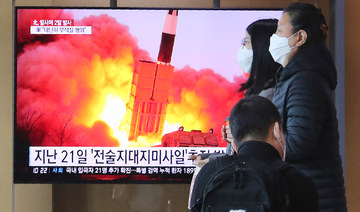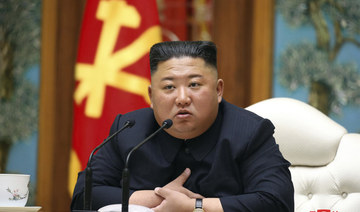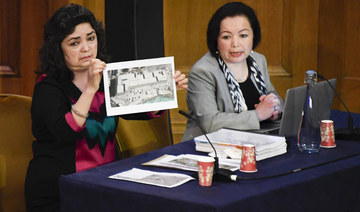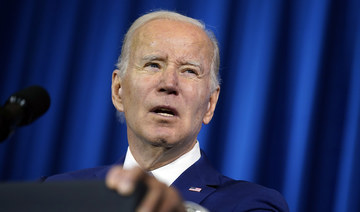SEOUL: North Korea on Thursday test-fired its first ballistic missiles since President Joe Biden took office as it expands its military capabilities and increases pressure on Washington while nuclear negotiations remain stalled.
Japanese Prime Minister Yoshihide Suga said North Korea’s resumption of ballistic testing threatens “peace and safety in Japan and the region,” and that Tokyo will closely coordinate with Washington and Seoul on the North’s military activities.
South Korean Foreign Minister Chung Eui-yong, after meeting his Russian counterpart in Seoul, expressed “deep concern” and urged the North to uphold its commitments for peace. Russian Foreign Minister Sergey Lavrov called for a swift resumption of dialogue to resolve the standoff with North Korea.
South Korea’s Joint Chiefs of Staff said the two short-range missiles were fired at 7:06 a.m. and 7:25 a.m. on the North’s eastern coast and flew 450 kilometers on an apogee of 60 kilometers before landing in the sea.
A senior US official, who spoke on condition of anonymity to discuss military observations, matched the information from Tokyo and Seoul, saying that initial assessments suggest the North fired two short-range ballistic missiles.
“This activity highlights the threat that North Korea’s illicit weapons program poses to its neighbors and the international community,” said US Indo-Pacific Command spokesperson Capt. Mike Kafka.
The launches came a day after US and South Korean officials said the North fired short-range weapons presumed to be cruise missiles into its western sea over the weekend.
North Korea has a history of testing new US administrations with missile launches and other provocations aimed at forcing the Americans back to the negotiating table.
Still, Thursday’s launches were a measured provocation compared to the nuclear and intercontinental missile tests in 2017 that inspired war fears before the North shifted toward diplomacy with the Trump administration in 2018.
Analysts expect the North to gradually dial up its weapons displays to gain bargaining power as it angles to get back into stalled talks aimed at leveraging nuclear weapons for badly needed economic benefits.
North Korea has so far ignored the Biden administration’s efforts to reach out, saying it won’t engage in meaningful talks unless Washington abandons its “hostile” policies.
It’s unclear how the Biden administration will respond before it completes its policy review on North Korea in coming weeks.
The missile launches followed a trip by Secretary of State Antony Blinken and Defense Secretary Lloyd Austin to Japan and South Korea last week as Washington pushes to restore its alliances in Asia.
During the trip, Blinken sternly criticized North Korea’s nuclear program and human rights record and pressed China to use its “tremendous influence” to convince the North to denuclearize.
North Korean state media had said Tuesday that leader Kim Jong Un reaffirmed his country’s traditional alliance with China while exchanging messages with Chinese President Xi Jinping in an apparent response to Biden’s efforts to coordinate action on North Korea with his allies.
The negotiations over the North’s nuclear program faltered after the collapse of Kim’s second summit with President Donald Trump in February 2019, when the Americans rejected North Korean demands for major sanctions relief in exchange for a partial surrender of its nuclear capabilities.
Since Trump’s first meeting with Kim in 2018, the North has not conducted nuclear or long-range missile tests, although analysts believe it has pressed ahead with both programs.
The North has continued short- and medium-range missile testing during its suspension of nuclear and long-range tests, expanding its ability to strike targets in South Korea and Japan, including US bases there.
Kim Dong-yub, an analyst from South Korea’s Institute for Far Eastern Studies, said the flight data suggests the North possibly tested a new solid-fuel system modeled after Russia’s 9K720 Iskander mobile ballistic missiles.
The low-flying missiles, which analysts see as potentially nuclear capable, are designed to be maneuverable so they have a better chance at evading missile defense systems.
The North had conducted at least 16 launches of these missiles and other new short-range systems from 2019 to 2020.
Trump had been accused of giving North Korea room to advance its weaponry by repeatedly dismissing its short-range missile tests despite the threat they posed to South Korea and Japan.
If Biden takes a different approach by imposing additional sanctions over short-range ballistic launches, the North may use it as an excuse for more provocative tests, including those involving submarine-launched missile systems, said Cheong Seong-Chang, an analyst at South Korea’s Sejong Institute.
Kim Jong Un’s powerful sister last week berated the United States over its latest round of combined military exercises with South Korea this month, warning Washington to “refrain from causing a stink” if it wants to “sleep in peace” for the next four years.
The North’s short-range tests on Sunday were its first known missile firings since April 2020. Biden played down those launches, telling reporters, “There’s no new wrinkle in what they did.”
North Korea test-fires ballistic missiles in message to US
https://arab.news/2u764
North Korea test-fires ballistic missiles in message to US
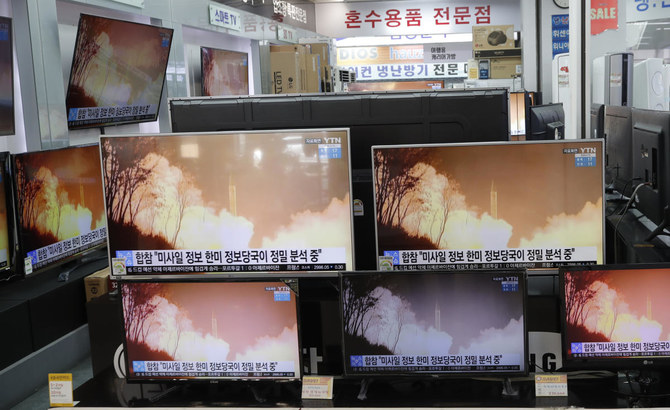
- The two short-range missiles were fired at 7:06 a.m. and 7:25 a.m. on the North’s eastern coast
- It’s unclear how the Biden administration will respond before it completes its policy review on Pyongyang
Ethiopia protests US ambassador’s speech after he calls for release of political prisoners

- Ethiopia's federal forces are engaging in fighting with several rebel groups in its regions as well as ethnic-related insurgencies, which have led to deaths and the displacement of people
NAIROBI, Kenya: Ethiopia lodged a complaint Thursday over statements by the US ambassador after he said the release of political prisoners could help the country engage in a productive dialogue and that detaining critics won’t resolve the country’s issues.
The Foreign Affairs Ministry said in a statement that Ambassador Ervin Massinga’s speech on policy and human rights contained “allegations” and “unsolicited advice,” and that it would work with the Embassy to correct the “errors and inconsistencies” in his statement.
“The statement is ill advised and contains uniformed assertions. It is contrary to the historic and friendly relations between Ethiopia and the United States,” the ministry wrote.
Massinga had said in his speech that detaining critics would not resolve Ethiopia’s outstanding issues and that “the political dialogue the Ethiopians need could be helped by releasing key political figures.”
He urged the government and rebel groups to agree to dialogue and that “the country has far more to gain through peace than on the battlefield.”
Federal forces in Ethiopia are engaging in fighting with several rebel groups in its regions as well as ethnic-related insurgencies, which have led to deaths and the displacement of people. Human rights groups have accused federal soldiers of rights abuses in regions like Amhara, where rebel groups are based.
A prominent opposition figure was gunned down last month after his release from prison, and a state-appointed rights group has called for an investigation into his death.
US bars imports from 26 Chinese textile firms over suspected Uyghur forced labor

- US officials believe Chinese authorities have established labor camps for Uyghurs and other Muslim minority groups in China’s western Xinjiang region
WASHINGTON: The United States blocked imports from 26 Chinese cotton traders or warehouse facilities on Thursday as part of its effort to eliminate goods made with the forced labor of Uyghur minorities from the US supply chain.
The companies are the latest additions to the Uyghur Forced Labor Prevention Act Entity List that restricts the import of goods tied to what the US government has characterized as an ongoing genocide of minorities in China’s Xinjiang region.
US officials believe Chinese authorities have established labor camps for Uyghurs and other Muslim minority groups in China’s western Xinjiang region. Beijing denies any abuses.
Many of the cotton companies listed are based outside of Xinjiang but source their cotton from the region, the US Department of Homeland Security said in a statement.
The designations help “responsible companies conduct due diligence so that, together, we can keep the products of forced labor out of our country,” Alejandro Mayorkas, Secretary of Homeland Security, said in the statement.
A spokesperson for the Chinese embassy in Washington criticized the move. “The so-called ‘Uyghur Forced Labor Prevention Act’ is just an instrument of a few US politicians to disrupt stability in Xinjiang and contain China’s development,” the spokesperson said.
Washington has restricted imports from 65 entities since the Uyghur Forced Labor Prevention Act Entity List law was passed in 2021, according to the department.
“We enthusiastically endorse DHS’s action today to nearly double the Uyghur Forced Labor Prevention Act’s ‘Entity List’ — while recognizing that the current list remains only a fraction of the businesses complicit in forced labor,” Rep. Chris Smith and Sen. Jeff Merkley, chairs of the bipartisan Congressional-Executive Commission on China, said in a statement.
The lawmakers want DHS to blacklist Chinese companies in the polysilicon, aluminum, PVC and rayon industries and any company in other parts of Asia making goods for the US market with inputs sourced from Xinjiang.
US Republicans confront Biden over pausing arms to Israel

- The Israel Security Assistance Support Act would prevent Biden from freezing any congressionally approved military aid to Israel
WASHINGTON: The Republican-led US House of Representatives voted Thursday to force President Joe Biden to end his hold on high-payload bombs approved for Israel but blocked over concerns about their use in Gaza.
The largely symbolic move — it has no chance of becoming law — is a response to Biden suspending the shipments over fears of mass Palestinian casualties as Israeli forces press their assault on the densely populated city of Rafah.
The Israel Security Assistance Support Act would prevent Biden from freezing any congressionally approved military aid to Israel, including 3,500 2,000-pound and 500-pound bombs that he has put on hold.
Republicans say Biden has no right to interfere with Israel’s military campaign, but House Democratic leadership described the bill as “another partisan stunt” infringing on the president’s ability to conduct foreign policy.
Nevertheless, 16 Democrats crossed the aisle to join Republicans in passing the bill by 224 votes to 187, while a further 13 did not vote, in a rare rebuke of Biden from a small but significant section of his own side.
The legislation will be dead on arrival in the Democratic-led Senate and Biden has pledged to veto it in any case.
The war in Gaza broke out after the October 7 attack by Hamas militants on southern Israel which resulted in the deaths of more than 1,170 people, mostly civilians, according to an AFP tally based on Israeli official figures.
Israel’s military retaliation has killed at least 35,233 people, mostly civilians, according to the health ministry in Hamas-ruled Gaza.
The White House has voiced frustration with Israel over the rising civilian death toll and particularly in its ground assault on Rafah, where more than one million people are sheltering.
Secretary of State Antony Blinken told NBC on Sunday that Israel “is on the trajectory potentially to inherit an insurgency with many armed Hamas left, or, if it leaves, a vacuum filled by chaos, filled by anarchy, and probably refilled by Hamas again.”
Republican House Speaker Mike Johnson accused Biden of “carrying water” for Hamas at the same time as doing nothing to stop the “dangerous nuclear buildup” in Iran, which attacked Israel last month.
“The president took no decisive action when Iran was planning to attack Israel, and now that Israel is fighting for its very survival, he is withholding weapons and threatening to veto legislation that would give the Israelis what they need to adequately defend themselves,” he said in a statement.
“The president and his administration need to reverse course immediately to stand with Israel and against the terrorism and atrocities of Iran and its proxies.”
The White House announced a $1 billion-plus package of arms for Israel this week that includes tank and mortar ammunition, offering cover for pro-Israel Democrats to reject the bill.
Trump lawyers vie to discredit key witness Cohen at trial

NEW YORK: Donald Trump’s lawyer took cracks at key witness Michael Cohen during wide-ranging cross-examination Thursday, questioning his memory and poking at his credibility during the first criminal trial of a former US president.
Trump is accused of falsifying business records as he reimbursed Cohen for a $130,000 payment to porn star Stormy Daniels before the 2016 election, when her story of a sexual encounter with Trump could have doomed his campaign.
The defense team has sought to instill doubt by casting Cohen as a disgruntled ex-employee who habitually lies and is out for blood at the trial, which is being heard just six months before election day when Trump hopes to retake the White House.
Under the close watch of Trump, defense attorney Todd Blanche kicked off his second round of questioning off by emphasizing Cohen’s history of lying, especially under oath.
In addition to listing Cohen’s myriad deceptions — which he has admitted to in the past including during direct questioning — the defense also played clips of the witness’s podcast episodes that frequently discussed the former president.
“You better believe I want this man to go down,” he said in one 2020 episode.
Cohen has said repeatedly he takes “responsibility” for his actions and has faced the consequences. Prior to the trial, including in his books, he had done little to hide his contempt for his former boss.
Trump meanwhile has complained his election campaign for another White House term is being stymied by the weeks-long court proceedings, which he has to attend every day.
Branding the case as politicized, he’s taken to bringing an entourage of leading Republicans to New York trial, with his latest crew of allies including congresspeople Matt Gaetz and Lauren Boebert.
The defense did not finish questioning Cohen and will continue Monday. There is no hearing on Friday due to the graduation of Trump’s youngest son, Barron.
Blanche appeared to be trying to crystallize his tactics Thursday after a meandering start this week, when yawns betrayed some jurors’ fatigue.
He has striven to ruffle Cohen, who has a reputation for a temper that could hurt him on the stand.
But Trump’s fixer-turned-foe has stayed largely composed and on topic.
As Blanche tried to catch Cohen in a lie regarding a call to Trump’s bodyguard, Blanche worked to crank the drama, the pitch of his voice rising.
“That was a lie,” Blanche said. “Admit it.”
“No sir,” Cohen replied. “I can’t.”
Prosecutors have indicated Cohen, 57, is their last witness in the case.
His story has generally lined up with both Daniels, and David Pecker, the tabloid boss who said he worked with Trump and Cohen to suppress negative coverage during his 2016 White House run.
Trump, who appeared alert Thursday after spending some time over recent days with his eyes closed, denies he ever had sex with Daniels.
After the prosecution rests, the defense can present a case, but Trump’s lawyers have remained vague on whether their client will testify.
The businessman famously considers himself his own best champion — but legal analysts believe he could be a liability on the stand.
The defense has indicated they wish to call one expert witness to explain campaign finance statutes.
But the prosecution has voiced opposition, saying that only the judge should explain how the law applies.
When the jury begins deliberating, the oft-salacious testimony will likely linger front-of-mind, but they’ll also have stacks of documents to pore over.
The charges hinge on financial records, and whether falsifying them was done with the intent to sway the 2016 presidential vote.
Prosecutors this week walked Cohen and the jury through the issue of 11 checks — most signed by Trump — in return for invoices Cohen said were falsified to cover up the reimbursement, with Trump’s knowledge.
They have said their redirect of Cohen will last approximately an hour when the defense finishes with him, which is expected by Monday midday.
Unless Trump opts to testify, closing arguments could come as soon as Tuesday.
Biden makes new outreach to Black voters as support slips

WASHINGTON: US President Joe Biden is trying to shore up his support among vital Black voters with a days-long series of events starting Thursday, including a visit to the former university of civil rights icon Martin Luther King.
Democrat Biden relied on African-American voters to help him beat Donald Trump in 2020, but some polls show they are increasingly deserting him ahead of November’s rematch with the Republican.
On Thursday Biden, 81, marked the 70th anniversary of a famous US Supreme Court ruling that overturned racial segregation in schools by meeting with key figures in the case in the Oval Office.
They included Adrienne Jennings Bennett, one of the plaintiffs in the 1954 Brown v. Board of Education case that proved a milestone for the US civil rights movement, and Cheryl Brown Henderson, a daughter of plaintiff Oliver Brown.
Biden “recognized that back in the 40s and 50s ... the folks that you see here were taking a risk when they signed up to be part of this case,” Henderson said after the meeting.
On Friday Biden visits the Smithsonian’s National Museum of African American History and Culture in Washington to give remarks to celebrate the anniversary of the Brown decision.
Later on Friday Biden and Vice President Kamala Harris — the first Black, South Asian and female “veep” in US history — will meet leaders from nine historically Black sororities and fraternities.
Biden is honoring “the legacy of those who paved the way for progress and hard-fought rights for Black Americans,” said White House Press Secretary Karine Jean-Pierre.
“He will also highlight his vision for how we must continue to build on these freedoms,” added Jean-Pierre, who is the first Black person to serve in the role.
Then on Sunday Biden will address students at the historically Black Morehouse College in Atlanta, Georgia, whose most famous former student is civil rights leader King.
Biden has a bust of King in the Oval Office in a sign of his support for racial equality, which he frequently contrasts with what he says is racially insensitive and anti-immigrant language by his rival Trump.
His visit to Morehouse is politically sensitive, however, as US campuses and graduation ceremonies have recently been disrupted by widespread protests against Biden’s support for Israel’s war in Gaza.
A senior White House official recently met students and faculty members at Morehouse to discuss objections to Biden delivering the commencement address, NBC News reported.
Biden’s outreach to Black voters comes days after a New York Times/Siena poll showed that in addition to trailing Trump in several key battleground states, he is also losing ground with African Americans.
Trump is winning more than 20 percent of Black voters in the poll — which would be the highest level of Black support for a Republican presidential candidate since the Civil Rights Act was enacted in 1964, The New York Times said.
Several other polls have also shown Biden’s support lagging among Black voters.
But a participant in Thursday’s White House gathering, Derrick Johnson, president of the country’s major civil rights organization NAACP, disputed the narrative that there has been “an erosion” of support among Black voters, and said polls have been wrong in several recent elections.
“I hope that the American public recognizes in order for us to remain a leading democracy we must participate at the highest level,” he said.
In 2020, Black voters were overwhelmingly loyal to the Democratic Party, with 92 percent voting for Biden and only eight percent for Trump, according to the Pew Research Center.



